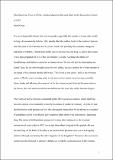Files in this item
The disastrous feast at Werla : political relationships and insult in the succession contest of 1002
Item metadata
| dc.contributor.author | Greer, Sarah | |
| dc.date.accessioned | 2020-06-20T23:36:09Z | |
| dc.date.available | 2020-06-20T23:36:09Z | |
| dc.date.issued | 2018-06-21 | |
| dc.identifier | 252985108 | |
| dc.identifier | ad1503d3-48ed-47d7-a04f-d51b8df36813 | |
| dc.identifier | 85062360093 | |
| dc.identifier | 000460617800001 | |
| dc.identifier.citation | Greer , S 2018 , ' The disastrous feast at Werla : political relationships and insult in the succession contest of 1002 ' , German History , vol. In press , ghy056 . https://doi.org/10.1093/gerhis/ghy056 | en |
| dc.identifier.issn | 0266-3554 | |
| dc.identifier.other | ORCID: /0000-0002-3347-7505/work/51010303 | |
| dc.identifier.uri | https://hdl.handle.net/10023/20114 | |
| dc.description | The research for this article was funded by the 'Power and Institutions in Medieval Islam and Christendom (PIMIC)'ITN, receiving funding from the European Union's Seventh Framework Programme for research, technological development and demonstration under grant agreement no. 316732; and the 'After Empire: Using and Not Using the Past in the Crisis of the Carolingian World, c.900–1050' HERA project, receiving funding from the European Union's Horizon 2020 research and innovation programme under grant agreement no. 649307. | en |
| dc.description.abstract | Ekkehard of Meißen’s appropriation of the feast prepared for the sisters of the late emperor Otto III was a turning point in the succession contest to determine the next ruler of Germany in 1002. Ekkehard’s arrival at the feast has been construed as an insult to the Ottonian sisters, marking the point at which he lost the succession race and paved the way for his own murder. However, there is no convincing explanation in current scholarship for why Ekkehard thought publicly insulting the family of the former emperor and breaking the regulated structure of Ottonian politics was a good move. This article sets Ekkehard’s actions at Werla into the broader context of Saxon politics by tracing the relationships between those present at the feast and the author of our account, Thietmar of Merseburg. In doing so, we can see that Ekkehard was not trying to offer an insult, but rather aggressively claim the support of one of the sisters by emphasizing their connections and mutual friends. By reassessing the disastrous feast at Werla, this article stresses the importance of taking into account the context in which demonstrative acts and disruptions of usual political conduct took place. | |
| dc.format.extent | 414177 | |
| dc.language.iso | eng | |
| dc.relation.ispartof | German History | en |
| dc.subject | DD Germany | en |
| dc.subject | T-NDAS | en |
| dc.subject | SDG 16 - Peace, Justice and Strong Institutions | en |
| dc.subject.lcc | DD | en |
| dc.title | The disastrous feast at Werla : political relationships and insult in the succession contest of 1002 | en |
| dc.type | Journal article | en |
| dc.contributor.sponsor | Marie Curie Fellowships | en |
| dc.contributor.institution | University of St Andrews. School of History | en |
| dc.contributor.institution | University of St Andrews. Institute of Legal and Constitutional Research | en |
| dc.identifier.doi | 10.1093/gerhis/ghy056 | |
| dc.description.status | Peer reviewed | en |
| dc.date.embargoedUntil | 2020-06-21 | |
| dc.identifier.grantnumber | en |
This item appears in the following Collection(s)
Items in the St Andrews Research Repository are protected by copyright, with all rights reserved, unless otherwise indicated.

